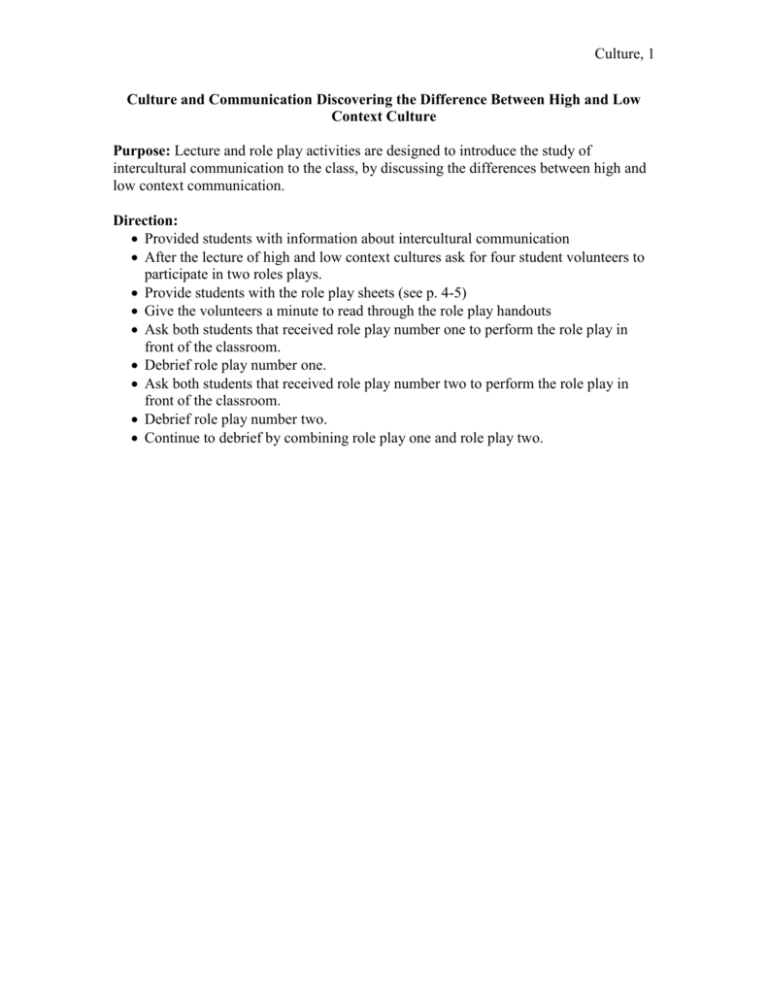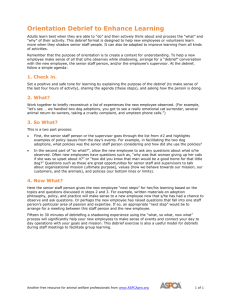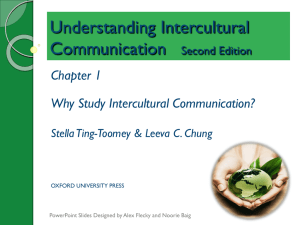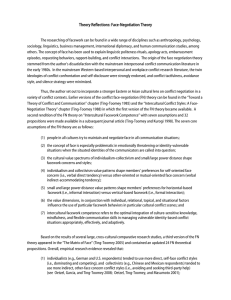Low Context Cultural Role Play
advertisement

Culture, 1 Culture and Communication Discovering the Difference Between High and Low Context Culture Purpose: Lecture and role play activities are designed to introduce the study of intercultural communication to the class, by discussing the differences between high and low context communication. Direction: Provided students with information about intercultural communication After the lecture of high and low context cultures ask for four student volunteers to participate in two roles plays. Provide students with the role play sheets (see p. 4-5) Give the volunteers a minute to read through the role play handouts Ask both students that received role play number one to perform the role play in front of the classroom. Debrief role play number one. Ask both students that received role play number two to perform the role play in front of the classroom. Debrief role play number two. Continue to debrief by combining role play one and role play two. Culture, 2 Debrief Role plays 1) Role play one (see p.4) 2) Debrief: a) What are some observations you made about this scene? b) What did you think about it? c) Why do you think Diana reacted the way she did? d) Why did you come to that conclusion? e) What would you do in this situation? 3) Role play two (see p.5) 4) Debrief: a) What are some observations you made about this scene? b) What did you think about it? c) Why do you think Mrs. B reacted the way she did? d) Why did you come to this conclusion? e) What would you do in this situation? f) How would you feel if you were in this situation? 5) General debrief: a) What would happen if Jane from role play role confronted Ms. B in role play two? i) How do you think Mrs. B would react? ii) How do you think Jane would react? iii) What might be some long term affects their communication? iv) How would you feel if you were Mrs. B? b) What knowledge can be gained from looking watching these role plays? Comparison Verbal Style Preferences 1) Why did you find those particular behaviors irritating? 2) Where did you acquire your own verbal habits or rituals? 3) What personal values influence your verbal styles? 4) What cultural values influence your verbal styles? Culture, 3 Comparison of Verbal Style Preferences Do you find any of the following behaviors irritating or frustrating when you encounter them during interactions with other individuals? Please indicate "Yes" or "No" after each question. Not answering questions directly: ______________ Talking bluntly: ______________ Insist on calling you Ms. or Mr. ______________ Making a request directly: ______________ Using lots of silence in conversation: ______________ Talking about themselves constantly ______________ Speaking slowly: ______________ Speaking really fast: ______________ Asking personal questions: ______________ Speaking softly: ______________ Speaking loudly: ______________ Constantly apologizing ______________ Adapted from Ting-Toomey, S. & Chung, L. C. (2005). Understanding Intercultural Communication. Los Angeles: Roxbury Publishing Company. Culture, 4 Role Play 1 Jane (knocks on her neighbor’s open window): Excuse me, it is 11 o’clock already, and your high-pitched opera singing is really disturbing my sleep. Please stop your gargling noise immediately! I have an important job interview tomorrow, and I want to get a good night sleep. I really need this job to pay my rent! Diane: (resentfully): Well, this is the only time I can rehearse my opera! I’ve an important audition coming up tomorrow. You’re not the only one that is starving, you know. I also need to pay my rent. Stop being so self-centered! Jane: (frustrated): I really think you’re being very unreasonable. If you don’t stop your singing right now I’m going to file a complaint with the apartment manager and he could evict you ….. Diane (sarcastically): Okay, be my guest…Do whatever you want. I’m going to sing as I please. . Adapted from Ting-Toomey, S. & Chung, L. C. (2005). Understanding Intercultural Communication. Los Angeles: Roxbury Publishing Company. Culture, 5 Role play 2 Mrs. A: Your daughter has started taking piano lessons, hasn’t she? I envy you, because you can be proud of her talent. You must be looking forward to her future as a pianist. I’m really impressed by her enthusiasm - every day, she practices so hard, for hours and hours, until late at night. Mrs. B: Oh, no not at all. She is just a beginner. We don’t know her future yet. We hadn’t realized that you could hear her playing. I’m so sorry you have been disturbed by her noise. Adapted from Ting-Toomey, S. & Chung, L. C. (2005). Understanding Intercultural Communication. Los Angeles: Roxbury Publishing Company.






